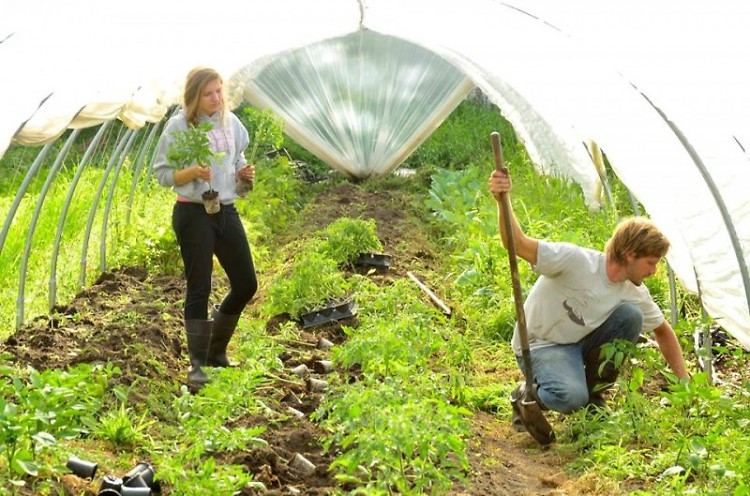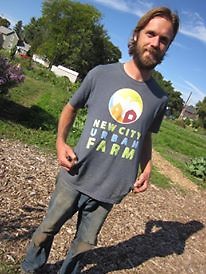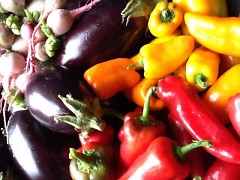I’m convinced that the ideology of capitalism is the ultimate root cause of the dysfunction of our diseased food system. Addressing food system work without this acknowledgement will only lead to shallow short term solutions.
Capitalism has traditionally been driven by three goals: land, labor and capital. The objective of the capitalist is to acquire land to obtain raw materials, which are then worked by labor to produce commodities that can be sold in order to produce capital. The capital in turn is used to secure more land and more labor to create even more capital and so on. This is the relentless circle we find ourselves in, a circle that is ever increasing in pace and scale as technological innovation creates greater efficiencies.
Just pause and consider our nation’s two greatest sins. What fueled the genocide of the Native Americans but the relentless pursuit of land? Consider again the enslavement of Africans to work that land- the need for labor. This stolen land and stolen labor in turn created vast sums of capital for northern European whites. The roots of white privilege and racism are here. The narratives of inferiority/superiority justified capitalism in motion.
But this is also the polluted ground from which our food system arose. Stolen land and stolen labor produces cheap food! We have never gotten over this addiction to cheap food. We also have not moved beyond unjustifiable exploitation of land and labor. We have only slightly altered the dynamics.
One change has been a decrease on the demand of labor. Industrialization has brought with it tools to model the farm after the factory. Now almost all of our major commodities like corn, soy and wheat are grown not with labor but with GPS driven tractors, mechanical harvesters, herbicides, pesticides and GMO seeds. Often commodity crops can be grown with an astounding ratio of one farmer to 1,000 acres. This shift has moved the greatest degree of exploitation from labor to land. For the land always prefers living hands (or hooves) to work it as opposed to mechanical ones.
The land, we must remember, is alive. Alive with more organisms than we can comprehend (more that the human population of the world in just one cup of soil). But this living land in the face of industrial agriculture has become compacted, eroded and sterile.
We would be naive to assume that we have moved beyond the exploitation of labor. In large scale vegetable and fruit growing where complete mechanization is not possible yet, African slaves have only been replaced by undocumented Latinos. The conditions of dismal housing, little to no pay and rites akin to a ⅔ person are all still there.
The question before us is this: what do we do in the face of this prevailing ideology? It is worth noting initially that our present economy does not have to embrace capitalism. When I start or run a business there is no law in place that insists I must exploit land and labor to maximize capital- unless I am a publicly traded company, in which case, corporations are in fact legally bound to maximize profit on behalf of their shareholders.
A business could, right now if it wanted to, simply decide to not pursue profit and instead only seek a living wage for all employees of that business. Such a business would pursue money and revenue but they would disregard net profits. Anytime net earnings were acquired they could be re-circulated back to the employees and/or the customer.
The problem before us is not structural but ideological. Capitalism and a free market are not synonymous. In a free market each person decides what they will produce and what they will sell it for. This is something that communism controls bureaucratically (just because I don’t like capitalism doesn’t mean I’m a communist!). The free market leaves this decision to the producer who carefully considers supply and demand. In other words, capitalism is an ideology that functions within a free market. But the market is actually free to choose other forms of economic ideologies.
This is our opportunity. I do not need to cause a revolution to overthrow the government of every developed country in order to improve our food system. I need only to persuade my neighbors to reject the ideology of capitalism.
This is how having conversations about food and faith might actually move us toward a healthy food system. Faith traditions are powerful ideologies, and we will need a powerful ideology to confront capitalism. My own tradition is the Christian tradition. And this tradition has plenty to say about money, and good food, and caring for the creation and love of neighbor. That many of Pope Francis’s words about the environment and the economy have created controversy and surprise is only a sign that Christians have been too quiet for too long in the face of this “throw away economy.” But the Pope’s unprecedented popularity among the people is also a sign of hope. The people are literally hungry for a true word. A word that will announce an alternative economy with a food system that feeds all with good food.
I believe there is space enough in our current economic structure for an alternative ideology, although I don’t expect this space to be provided easily. My own imagination inclines me towards the pursuit of what I call a generous reciprocal free market economy based on the ideology of the Judaic/Christian concept of Shalom. In this market- imagine a farmer’s market- the producer of eggs nurtures the pasture which nurtures the hens which make deep standing golden yokes which nurtures the eater. This farmer sells or trades these eggs for $5 a dozen to make a living wage ($15-20 an hour) and in order to properly care for her land. With this $5 she approaches another farmer and exchanges her eggs fairly for two pounds of fully ripe meaty Brandywine tomatoes.
The capitalist ruins this idyllic exchange. The capitalist ignores the land to produce more eggs than are reasonable for the land or the hens (“I bet we could fit a million birds in this barn!”). The capitalist now has more eggs to exchange for more capital. But the capitalist is also not content with a fair exchange. When he approaches the exchange of eggs to tomatoes he notes that eggs keep for two weeks which gives him power over the tomato grower. He waits to the end of the market day to “get a deal” (code for “to take advantage of his neighbor”) in order to exchange one dozen eggs for five pounds of tomatoes. He gains wealth in this instance but at the expense of the living wage of his neighbor.
It's a simple image that requires more time to consider, but the point is this: consumers and producers can subscribe to alternative generous and reciprocal economic ideologies right now. For the readers that with me believe in a God that created all things, and a God that has called and empowered us to tend to this creation in order to love our neighbor as ourselves, we have a responsibility to wake up, to speak up and to start enacting something other than what we have been given from the hands of the capitalists.
The Rapidian, a program of the 501(c)3 nonprofit Community Media Center, relies on the community’s support to help cover the cost of training reporters and publishing content.
We need your help.
If each of our readers and content creators who values this community platform help support its creation and maintenance, The Rapidian can continue to educate and facilitate a conversation around issues for years to come.
Please support The Rapidian and make a contribution today.



